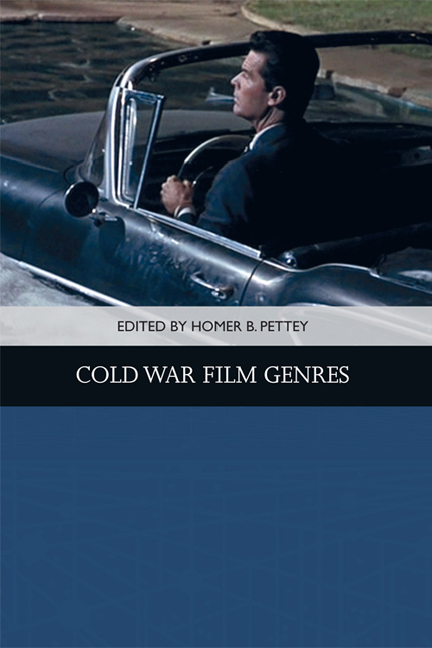Book contents
- Frontmatter
- Contents
- List of Illustrations
- Acknowledgments
- Notes on the Contributors
- 1 Introduction: Cold War Genres and the Rock-and-Roll Film
- 2 Social Factors in Brainwashing Films of the 1950s and 1960s
- 3 The Berlin Crisis? Piffl!: Billy Wilder’s Cold War Comedy, One, Two, Three
- 4 The Small Adult Film: A Prestige Form of Cold War Cinema
- 5 “I’m Lucky – I Had Rich Parents”: Disability and Class in the Postwar Biopic Genre
- 6 Rogue Nation, 1954: History, Class Consciousness, and the “Rogue Cop” Film
- 7 Internal Enmity: Hollywood’s Fragile Home Stories in the 1950s and 1960s
- 8 Suburban Sublime
- 9 Domestic Containment for Whom? Gendered and Racial Variations on Cold War Modernity in the Apartment Plot
- 10 Success and the Single Girl: Urban Romances of Working Women
- 11 Paris Loves Lovers and Americans Loved Paris: Gender, Class, and Modernity in the Postwar Hollywood Musical
- 12 Straight to Baby: Scoring Female Jazz Agency and New Masculinity in Henry Mancini’s Peter Gunn
- Index
3 - The Berlin Crisis? Piffl!: Billy Wilder’s Cold War Comedy, One, Two, Three
Published online by Cambridge University Press: 24 April 2021
- Frontmatter
- Contents
- List of Illustrations
- Acknowledgments
- Notes on the Contributors
- 1 Introduction: Cold War Genres and the Rock-and-Roll Film
- 2 Social Factors in Brainwashing Films of the 1950s and 1960s
- 3 The Berlin Crisis? Piffl!: Billy Wilder’s Cold War Comedy, One, Two, Three
- 4 The Small Adult Film: A Prestige Form of Cold War Cinema
- 5 “I’m Lucky – I Had Rich Parents”: Disability and Class in the Postwar Biopic Genre
- 6 Rogue Nation, 1954: History, Class Consciousness, and the “Rogue Cop” Film
- 7 Internal Enmity: Hollywood’s Fragile Home Stories in the 1950s and 1960s
- 8 Suburban Sublime
- 9 Domestic Containment for Whom? Gendered and Racial Variations on Cold War Modernity in the Apartment Plot
- 10 Success and the Single Girl: Urban Romances of Working Women
- 11 Paris Loves Lovers and Americans Loved Paris: Gender, Class, and Modernity in the Postwar Hollywood Musical
- 12 Straight to Baby: Scoring Female Jazz Agency and New Masculinity in Henry Mancini’s Peter Gunn
- Index
Summary
“So horribly sad. How is it I feel like laughing?” That's how an American agent reacts – presumably CIA, though never specified – in Alfred Hitchcock's 1959 thriller, North by Northwest. He's referring to the grotesque situation in which a New York advertising executive, Roger Thornhill (Cary Grant), finds himself after innocently wandering into a case of mistaken identity. This confusion of character culminates when he's standing next to a United Nations official at precisely the moment when a knife flies into the image and lands squarely in the official's back. The man drops to the ground, dead. Thornhill immediately pulls the knife out of the corpse's back and, holding it aloft as flashbulbs pop, ridiculously declares, “I didn't have anything to do with this!”
Thornhill's particular predicament is grim but no less funny for it, as the agent observes. But his reaction to Thornhill's awful situation says something surprising about a much larger issue – the American cultural psyche during the Cold War. One imagines – wrongly – that there was nothing funny about the threat of nuclear war that hovered over the nation, like an invisible mushroom cloud, from 1947 to 1991, the Cold War's most widely accepted brackets. The evidence suggests otherwise. Stanley Kubrick's black comedy Dr. Strangelove: Or, How I Learned to Stop Worrying and Love the Bomb (1964), is the most prominent example of how Hollywood examined United States–Soviet Union tensions during the period and found very good reasons to laugh. Peter Sellers's spectacular performance as the eponymous nuclear physicist (one of the three roles he plays in the film) is so hilarious that one can see another cast member (Peter Bull) cracking up in the background of a shot that made it into the release print, Kubrick evidently deciding that Sellers's gestures and voice in that take were worth violating one of the basic tenets of classical Hollywood cinema – namely, that actors should not break character onscreen and so expose the means and forms of the film's construction.
One could argue that almost every comedy made during the Cold War is a Cold War comedy, especially during the 1950s and early 1960s, when paranoia reigned.
- Type
- Chapter
- Information
- Cold War Film Genres , pp. 42 - 61Publisher: Edinburgh University PressPrint publication year: 2018

